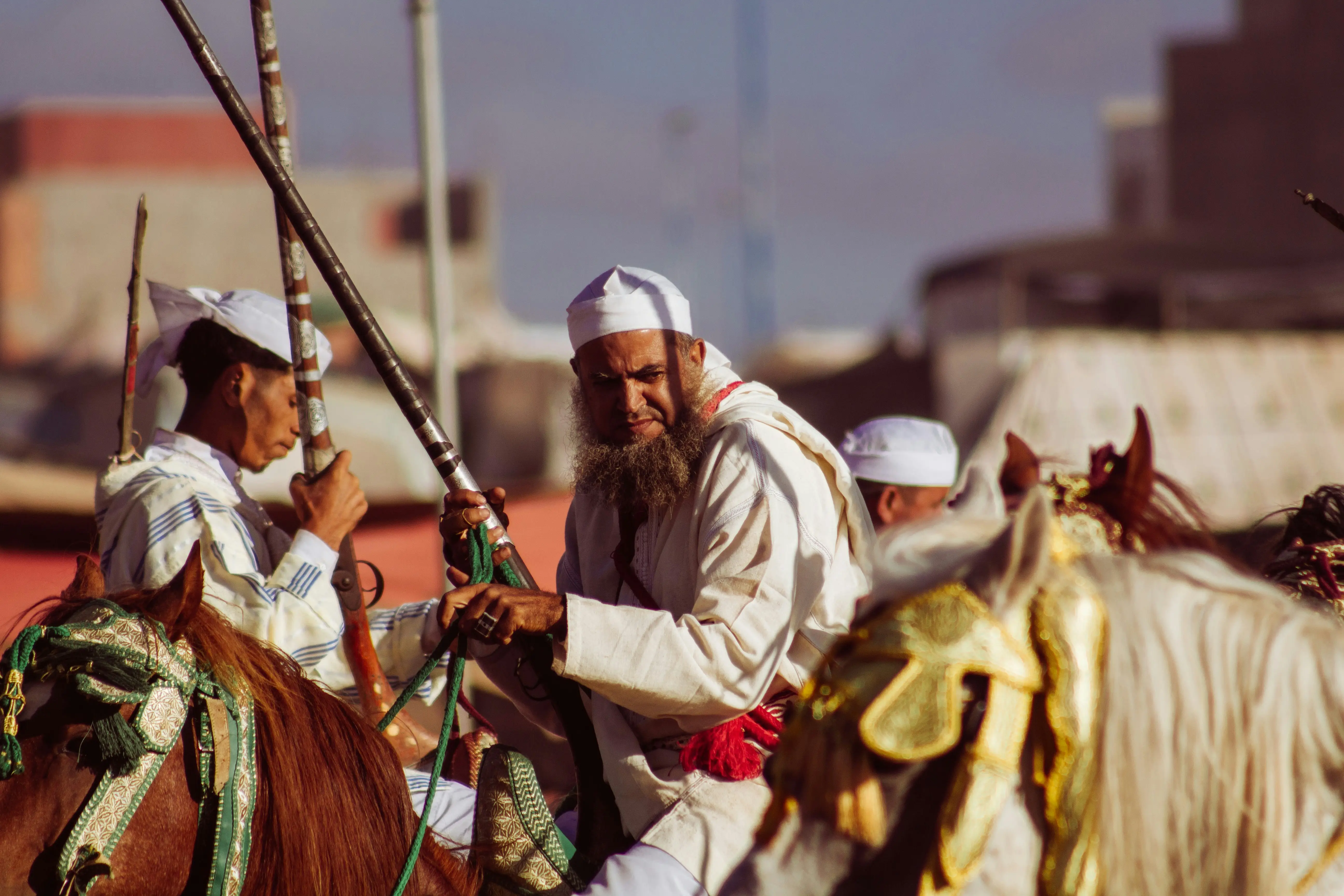Morocco Cultural Etiquette Guide: Respectful Travel in the Kingdom
Morocco’s rich cultural tapestry is woven from Arab, Berber, and Islamic traditions spanning over a thousand years. Understanding and respecting local customs isn’t just about avoiding offense — it’s about opening doors to authentic experiences and genuine connections with Moroccan people. This comprehensive guide will help you navigate cultural nuances with grace and appreciation.
Understanding Islamic Culture in Morocco
The Foundation of Daily Life
Islam shapes Moroccan society in profound ways that visitors should understand and respect. Key elements include:
- The Five Pillars of Islam:
- Shahada (Declaration of faith)
- Salah (Prayer) - Five times daily
- Zakat (Charitable giving)
- Sawm (Fasting during Ramadan)
- Hajj (Pilgrimage to Mecca)
Daily Prayer Observance
Prayer times structure the day:
- Fajr (Dawn): Before sunrise
- Dhuhr (Midday): After the sun reaches its peak
- Asr (Afternoon): Late afternoon
- Maghrib (Sunset): Just after sunset
- Isha (Night): After twilight
What this means for travelers:
- The call to prayer (adhan) is heard throughout the day
- Some shops may close briefly during prayer times
- Friday midday prayers are particularly important
- Lower your voice near mosques during prayer times
Mosque Etiquette
Most mosques in Morocco are closed to non-Muslims, except for the Hassan II Mosque in Casablanca. When visiting mosques:
- Remove shoes before entering
- Dress very conservatively (long pants, long sleeves, head covering for women)
- Maintain quiet and respectful behavior
- Don’t point cameras or phones at people praying
- Follow your guide’s instructions carefully
- Avoid walking in front of people who are praying
Social Interactions and Greetings
Appropriate Greetings
- Traditional Islamic greeting:
- “As-salaam alaikum” (Peace be upon you)
- Response: “Wa alaikum as-salaam” (And upon you, peace)
- Common secular greetings:
- “Ahlan wa sahlan” (Welcome)
- “Bonjour” (Good morning - French influence)
- “Bonsoir” (Good evening)
Handshakes and Physical Contact
- Same-gender interactions:
- Handshakes are common and appreciated
- Close friends may embrace or kiss cheeks
- Handshakes tend to be softer than Western style
- Cross-gender interactions:
- Wait for the other person to extend their hand first
- Many conservative Muslims avoid physical contact with opposite gender
- A slight bow or hand-to-heart gesture is respectful
- Don’t take it personally if someone doesn’t shake your hand
Personal Space and Eye Contact
- Moroccans may stand closer during conversations than Americans/Europeans
- Maintain respectful eye contact but avoid intense staring
- Pointing with the index finger is rude — use an open hand instead
- Showing the sole of your foot is disrespectful
Dress Code and Appearance
General Guidelines for All Travelers
- Dress conservatively: cover shoulders and knees at minimum
- Avoid tight-fitting or revealing clothing
- Choose breathable, loose-fitting fabrics
- Dress more conservatively in rural areas and religious sites
Specific Guidelines for Women
- Recommended: long pants, maxi skirts or knee-length skirts with leggings
- Tops covering shoulders and chest
- Lightweight scarf for head covering when needed
- Comfortable closed-toe shoes for walking
- Avoid short shorts, mini skirts, tank tops, sleeveless or low-cut tops, and see-through fabrics
Specific Guidelines for Men
- Long pants preferred (shorts acceptable in tourist areas)
- Shirts with sleeves
- Closed-toe shoes for mosque visits
- Remove hats when entering homes or religious sites
- Normal swimwear acceptable at beaches and hotel pools but cover up when leaving those areas
Dining Etiquette and Food Culture
Traditional Dining Customs
- Meals are social experiences to be shared
- Bread is sacred — never waste or throw it away
- Always use your right hand for eating and passing food (left hand is considered unclean)
Table Manners
- Wash hands before eating or use hand sanitizer
- Wait for the host to begin or say “Bismillah” (In the name of Allah)
- Accept offered food; refusing can be seen as rude
- Take food only from your section of the communal dish
- Don’t reach across others
- Tear bread into small pieces when eating
- Compliment the food with “Bslama” (with peace/health)
Tea Ceremony Etiquette
- Accept offered mint tea — a symbol of hospitality
- Hold glass by the rim, not the sides
- Served in three rounds, each with special significance
- Refusing tea can be seen as rejecting hospitality
Ramadan Considerations
- Respect fasting locals by not eating, drinking, or smoking publicly during daylight
- Many restaurants close during the day but reopen after sunset
- Iftar (breaking fast) is a special time; you may be invited to join
- Suhoor (pre-dawn meal) may cause early wake-up calls
Gift-Giving and Hospitality
Moroccan Hospitality
- “The guest is a blessing from God” — Moroccan proverb
- Expect generous hospitality even from modest households
- Multiple invitations to tea or meals are common
- Hosts insist you take seconds or thirds
- Genuine interest in your home country and family
Appropriate Gifts
- Pastries or sweets from a good bakery
- Small gifts from your home country
- Flowers (avoid chrysanthemums associated with funerals)
- Quality tea or coffee
Gifts to Avoid
- Alcohol (unless you know the family drinks)
- Leather products (unless known to be used)
- Items made from pork or containing gelatin
- Expensive gifts that may cause embarrassment
Accepting Invitations
- Accept graciously; refusing can be offensive
- Remove shoes when entering homes
- Compliment the home and family
- Show appreciation for food and hospitality
- Don’t overstay unless encouraged
Business and Shopping Etiquette
Bargaining Culture
- Haggling is expected and respected in traditional markets
- Start with a smile and friendly greeting
- Show genuine interest in craftsmanship
- Be patient; rushing offends vendors
- Stay respectful even if no agreement is reached
- Honor the agreed price
Fixed Price Situations
- Modern stores, malls, restaurants, official transportation, government fees, and museums have fixed prices
Business Interactions
- Punctuality appreciated but flexibility expected
- Begin meetings with personal conversation
- Exchange business cards with both hands
- Dress conservatively and professionally
- Avoid Friday afternoons due to prayer time
Photography and Privacy
Photography Etiquette
- Always ask permission before photographing people (“Mumkin sura?” means “Can I take a photo?”)
- Respect refusal gracefully
- Be especially cautious with women and children
- Some may ask for a small tip for posed photos
What Not to Photograph
- Military or police installations
- Government buildings
- People without permission
- Religious ceremonies without invitation
- Private property without permission
Respecting Privacy
- Don’t peer into private courtyards or homes
- Respect family spaces and women’s areas
- Ask before entering someone’s property
- Be mindful of family customs
Language and Communication
Useful Phrases for Respectful Interaction
- Religious expressions:
- “Inshallah” — God willing
- “Alhamdulillah” — Praise be to God
- “Bismillah” — In the name of God
- “Barakallahu fik” — May God bless you
- Polite expressions:
- “Min fadlik” — Please (to a man or woman)
- “Shukran jazeelan” — Thank you very much
- “Afwan” — You’re welcome
- “Aasif” — Sorry/Excuse me
Non-Verbal Communication
- Avoid: pointing with index finger, showing sole of foot, thumbs up, OK sign
- Respectful gestures: hand to heart greeting, both hands when exchanging items, slight bow, open palm when pointing directions
Special Occasions and Festivals
Religious Holidays
- Eid al-Fitr: End of Ramadan celebration
- Eid al-Adha: Festival of Sacrifice
- Mawlid: Prophet Muhammad’s birthday
- Islamic New Year: Muharram
During these holidays, many businesses close, special foods are prepared, and family gatherings and prayers take place.
Cultural Celebrations
- Berber New Year (Yennayer)
- Rose Festival in El Kelaa M’Gouna
- Date Festival in Erfoud
- Almond Blossom Festival in Tafraoute
Common Mistakes to Avoid
Unintentional Offenses
- Don’t discuss religion critically or compare Islam unfavorably
- Avoid joking about religious practices
- Respect prayer times and observances
- Don’t assume all Moroccans speak Arabic; many speak Berber
- Avoid generalizations about Arab culture
- Don’t expect everyone to speak French or English
Behavioral Guidelines
- Avoid public displays of affection, especially between unmarried couples
- Don’t drink alcohol publicly outside tourist areas
- Avoid loud behavior near mosques
- Don’t point cameras at people without permission
- Don’t refuse hospitality when offered
Modern Morocco: Balancing Tradition and Change
Urban vs. Rural Differences
- In cities (Casablanca, Rabat, Marrakech):
- More relaxed dress codes
- English is more common
- International restaurants and bars available
- Younger generations more liberal
- In rural/traditional areas:
- Stricter adherence to customs
- More conservative dress expected
- Traditional gender roles more prevalent
- Hospitality often more formal and generous
Generational Differences
- Older generations tend to be more traditional and French-speaking
- Younger generations are more internationally minded, often English-speaking, with more liberal views but still respect tradition
Building Meaningful Connections
Showing Genuine Interest
Appreciated topics: Moroccan history, culture, your home country, food, traditional crafts, and travel experiences.
Topics to approach carefully: politics, religion (unless brought up), personal relationships, economic conditions, regional conflicts.
Learning and Growing
Embrace learning about Islam and Moroccan culture, practice language skills, try new foods, understand different perspectives, and build cross-cultural friendships.
Conclusion
Respecting Moroccan culture isn’t about perfect adherence to every custom — it’s about genuine respect, openness, and curiosity. Moroccans warmly welcome visitors who show cultural sensitivity and interest in their way of life. Your effort will bring warmer welcomes, deeper experiences, and lasting memories.
Don’t fear making mistakes — most Moroccans understand cultural differences and appreciate your respectful effort. When unsure, observe locals, ask respectfully, and let curiosity guide you.
Ready to experience Morocco’s rich culture firsthand? Contact OverJoy Morocco Travel for immersive tours led by local guides who help you navigate customs confidently and create authentic cultural connections.
Want to deepen your cultural understanding?
Join our cultural immersion experiences and cooking classes with local families.
Contact us for authentic exchanges beyond typical tourist experiences.



